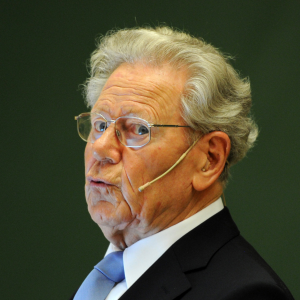Fr. Hans Küng, the Swiss theologian, has told The Tablet that he has received a letter from Pope Francis that responds to his "request to give room to a free discussion on the dogma of infallibility".
The Tablet has been unable to confirm the existence of the letter as Küng refused requests by The Tablet and the National Catholic Reporter to the Swiss theologian to view a copy of the letter.
"On 9 March, my appeal to Pope Francis to give room to a free, unprejudiced and open-ended discussion on the problem of infallibility appeared in the leading journals of several countries. I was thus overjoyed to receive a personal reply from Pope Francis immediately after Easter. Dated 20 March, it was forwarded to me from the nunciature in Berlin."
Küng said that in the Pope’s reply, Francis makes the following points which "are significant" to the Swiss theologian: "The fact that Pope Francis answered at all and did not let my appeal fall on deaf ears; the fact that he replied himself and not via his private secretary or the Secretary of State; that he emphasises the fraternal manner of his Spanish reply by addressing me as Lieber Mitbruder (Dear Brother) in German and puts this personal address in italics, that he clearly read the appeal, to which I had attached a Spanish translation, most attentively.
"[And] that he is highly appreciative of the considerations which had led me to write in which I suggest theologically discussing the different issues which the infallibility dogma raises in the light of Holy Scripture and Tradition with the aim of deepening the constructive dialogue between the 'semper reformanda' 21st century Church and the other Christian Churches and post-modern society."
"Pope Francis has set no restrictions," Küng added. "He has thus responded to my request to give room to a free discussion on the dogma of infallibility. I think it is now imperative to use this new freedom to push ahead with the clarification of the dogmatic definitions which are a ground for controversy within the Catholic Church and in its relationship to the other Christian Churches.
The Swiss theologian said in his statement to The Tablet that the letter is part of the "new freedom" that Pope Francis has brought to the Vatican.
"I am fully convinced that in this new spirit a free, impartial and open-ended discussion of the infallibility dogma, this fateful key question of destiny for the Catholic Church, will be possible,"Küng said. "I am deeply grateful to Pope Francis for this new freedom and combine my heartfelt thanks with the expectation that the bishops and theologians will unreservedly adopt this new spirit and join in this task in accordance with the Scriptures and with our great church tradition.
Full text of Fr. Hans Küng statement. Translation: Christa Pongratz-Lippitt, Vienna
The Pope answers Hans Küng
On 9 March, my appeal to Pope Francis to give room to a free, unprejudiced and open-ended discussion on the problem of infallibility appeared in the leading journals of several countries. I was thus overjoyed to receive a personal reply from Pope Francis immediately after Easter. Dated 20 March, it was forwarded to me from the nunciature in Berlin.
In the Pope’s reply, the following points are significant for me:
– The fact that Pope Francis answered at all and did not let my appeal fall on deaf ears so to speak;
– The fact that he replied himself and not via his private secretary or the Secretary of State;
– That he emphasises the fraternal manner of his Spanish reply by addressing me as Lieber Mitbruder (Dear Brother) in German and puts this personal address in italics,
– That he clearly read the appeal, to which I had attached a Spanish translation, most attentively;
– That he is highly appreciative of the considerations which had led me to write Volume 5 in which I suggest theologically discussing the different issues which the infallibility dogma raises in the light of Holy Scripture and Tradition with the aim of deepening the constructive dialogue between the “semper reformanda” 21st century Church and the other Christian Churches and post-modern society.
Pope Francis has set no restrictions. He has thus responded to my request to give room to a free discussion on the dogma of infallibility. I think it is now imperative to use this new freedom to push ahead with the clarification of the dogmatic definitions which are a ground for controversy within the Catholic Church and in its relationship to the other Christian Churches.
I could not have foreseen then quite how much new freedom Pope Francis would open up in his Post-Synodal Exhortation Amoris Laetitia. Already in the introduction he declares “that not all doctrinal discussions, moral or pastoral, need to be resolved with interventions of the Magisterium.” He takes issue with “cold bureaucratic morality” and does not want bishops to continue behaving as if they were “arbiters of grace”. He sees the Eucharist not as a reward for the perfect but as “nourishment for the weak”. He repeatedly quotes statements made at the Episcopal Synod or at national bishops’ conferences. Pope Francis no longer wants to be the sole spokesman of the Church.
This is the new spirit that I have always expected from the Magisterium. I am fully convinced that in this new spirit a free, impartial and open-ended discussion of the infallibility dogma, this fateful key question of destiny for the Catholic Church, will be possible. I am deeply grateful to Pope Francis for this new freedom and combine my heartfelt thanks with the expectation that the bishops and theologians will unreservedly adopt this new spirit and join in this task in accordance with the Scriptures and with our great church tradition.
KEEP UP TO DATE ON TWITTER AND FACEBOOK...
Follow all the latest news and events from the Catholic world via The Tablet's Twitter feed @the_tablet
Or you can join in the debate at our community page on Facebook




 Loading ...
Loading ...